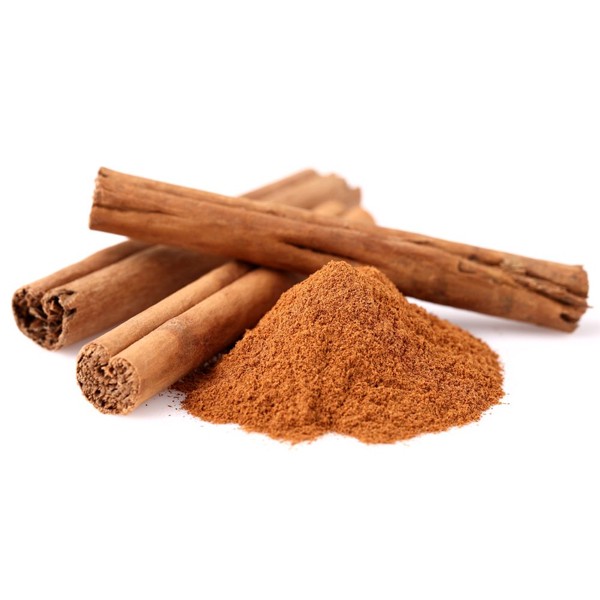Ceylon Cinnamon
Cinnamomum zeylanicum

Cinnamon is made by cutting the stems of cinnamon trees. Then the inner bark is extracted and the woody parts are removed. When dry, it forms strips that are twisted into rolls, called cinnamon sticks. These sticks can be ground to make cinnamon powder. The pungent taste and smell come from the high content of the cinnamaldehyde compound (about 90% of the essential oil from the bark). Scientists believe that this compound is responsible for most of cinnamon’s powerful effects on health and metabolism.
Properties of cinnamon:
1. Antioxidant. Antioxidants protect our body from oxidative damage caused by free radicals. Cinnamon is full of powerful antioxidants, including polyphenols. One study found that cinnamon supplementation can significantly increase blood levels of antioxidants while reducing levels of markers used to measure inflammation, such as C-reactive protein.
2. Anti-inflammatory. Studies show that this spice and its antioxidants have powerful anti-inflammatory properties, which can help reduce the risk of disease.
3. Cardioprotective. According to one study, supplementation with at least 1.5 grams or about 3/4 teaspoon of cinnamon per day was able to reduce triglyceride, total cholesterol, LDL (bad) cholesterol, and blood sugar levels in people with metabolic disease. Cinnamon can lower triglyceride and total cholesterol levels, both of which are risk factors for heart disease. Cinnamon has also been shown to lower blood pressure when consumed consistently for at least 8 weeks.
4. Reduces insulin resistance. Insulin is one of the key hormones that regulate metabolism and energy use. It is also necessary to transport blood sugar from our bloodstream to our cells. However, some people are resistant to the effects of insulin. This is known as insulin resistance, a hallmark of conditions such as metabolic syndrome and type 2 diabetes. By increasing insulin sensitivity, cinnamon can lower blood sugar levels and help better control blood sugar.

5. Lowers blood sugar levels. Cinnamon is well known for its blood sugar lowering properties. In addition to its beneficial effects on insulin resistance, cinnamon can lower blood sugar through several other mechanisms. First, cinnamon has been shown to reduce the amount of sugar that enters the bloodstream after a meal by interfering with numerous digestive enzymes, which slows down the breakdown of carbohydrates in our digestive tract.
Second, a compound in cinnamon can mimic the effects of insulin to improve the uptake of sugar into cells. Numerous human studies have confirmed the beneficial effects of cinnamon, showing that it can lower fasting blood sugar levels and improve hemoglobin A1c, a marker of long-term blood sugar control. An effective dose is usually 1-6 g or about 0.5-2 teaspoons of cinnamon per day.
6. Neuroprotective. Neurodegenerative diseases are characterized by progressive loss of structure or function of nerve cells. Alzheimer’s and Parkinson’s disease are the two most common types (25 Trusted Source). Certain compounds found in cinnamon appear to inhibit the accumulation of tau protein, or t protein in the brain, which is one of the hallmarks of Alzheimer’s disease.
In a 2014 study conducted on mice with Parkinson’s disease, cinnamon helped protect neurons, normalize neurotransmitter levels, and improve motor function. However, these effects need further study in humans.
7. Anticancer. Cinnamon has been extensively studied for its potential use in cancer prevention and treatment. Overall, evidence is limited to test-tube and animal studies suggesting that cinnamon extracts may provide protection against cancer. Its effect is to reduce the growth of cancer cells and the formation of blood vessels in tumors, and it appears to be toxic to cancer cells, causing cell death.
One study in mice with ovarian cancer found that cinnamaldehyde can block the expression of certain proteins involved in cancer development. These findings were supported by test-tube experiments, which showed that cinnamaldehyde can reduce the growth and spread of ovarian cancer cells. However, more research is needed to evaluate cinnamon’s potential anticancer effects in humans.
8. Antimycotic and antibacterial. Cimetaldehyde, one of the main active components of cinnamon, is useful against various types of infections. Test-tube studies have shown that cinnamon oil helps kill certain fungi that cause respiratory tract infections. It can also inhibit the growth of certain bacteria, including listeria and salmonella. In addition, cinnamon’s antimicrobial effects can help prevent tooth decay and reduce bad breath.
9. Antivirus. Some research suggests that cinnamon can help protect against certain viruses. For example, cinnamon extracted from Cassia cultivars is thought to be beneficial against HIV-1, the most common strain of HIV in humans. Other studies suggest that cinnamon may offer protection against other viruses as well, including influenza and dengue, a viral infection transmitted by mosquitoes.
References
- Gruenwald J, Freder J, Armbruester N. Cinnamon and health. Crit Rev Food Sci Nutr. 2010
- Singh G, Maurya S, DeLampasona MP, Catalan CA. A comparison of chemical, antioxidant and antimicrobial studies of cinnamon leaf and bark volatile oils, oleoresins and their constituents. Food Chem Toxicol. 2007
- Simic A, Sokovic MD, Ristic M, Grujic-Jovanovic S, Vukojevic J, Marin PD. The chemical composition of some lauraceae essential oils and their antifungal activities. Phytother Res. 2004
- Baratta MT, Dorman HJD, Deans SG, Figueiredo AC, Barroso JG, Ruberto G. Antimicrobial and antioxidant properties of some commercial essential oils. Flavour Fragr J. 1998
- Maidment C, Dyson A, Haysom I. A study into the antimicrobial effects of cloves (syzgium aromaticum) and cinnamon (cinnamomum zeylanicum) using disc-diffusion assay. Nutr Food Sci. 2006
